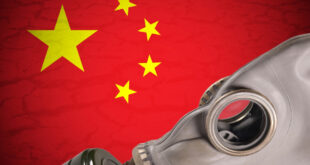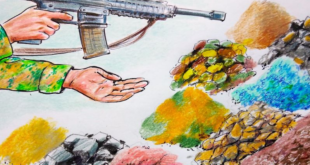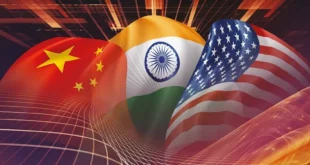With foreign influences and the pandemic undermining democracy in the V4 and the Western Balkans, external security – delivered via NATO – is fundamental, Kurt Volker argues.
After a meeting-heavy June that saw the leaders of the international community converge on several stages and fora, it appears as though China had taken over the mantle of chief villain from Russia in the global order as seen from the West.
In a historical first, NATO singled out China as a threat to the “rules-based international order”, with its expanding nuclear arsenal, lack of transparency, use of disinformation and the largest armed forces in the world posing “systemic challenges” to the established order.
The China-focused concluding statement of NATO’s most recent summit on June 14 came on the back of criticism of the country by the G7, which denounced human rights abuses in China in relation to the plight of the Uyghur community a mere week before NATO’s meeting took place. This was met with a sharp response from China, the BBC reported.
“China is seeking to weaken and divide NATO and particularly the EU, so that it has the opportunity to set the terms of trade, economic engagement, state-to-state business deals and so forth,” Kurt Volker, former US special representative for Ukraine and US ambassador to NATO in 2008-2009, told BIRN at this year’s GLOBSEC forum on June 15-17.
Weakness and dependency
Europe faces a mixed bag of threats from China, Volker suggested, with data privacy and ID security among the most pressing issues. “China has deployed 5G technology which, as the US and others believe, has the capacity to absorb data that’s collected in the country, so they’re gaining a massive database about all of us,” the diplomat argued.
As cash-rich China invests large sums of money in heavily indebted Europe for infrastructure investments like ports, roads and rails, it creates a platform to export very cheap goods that undermines local economies, Volker added. “We’ve seen this in Bratislava and Budapest, where the influx of goods undercut what would have been produced locally.”
China has even set foot in European academia. In December last year, Fudan University, one of China’s top higher education institutions, chose to build its first overseas campus in Budapest after it signed a memorandum of understating with the East-friendly Hungarian government.
As more Chinese cash is splashed around Central and Eastern European, some countries have become too dependent on China due to the accumulating debt, Volker warned. “This gives China influence over their policies and views in organisations like NATO and the EU. It creates weakness and dependency in Europe and NATO, whereas China is a determined authoritarian state at home pursuing regional and perhaps global authority,” he said.
The anti-Chinese push of both the G7 and the hitherto Russia-focused NATO was spearheaded by US President Joe Biden, who met with his Russian counterpart Vladimir Putin for inaugural talks in Geneva shortly after NATO’s summit, despite tense relations between the two countries.
Progress reversed
Still, inside European states, Russia is even more directly threatening than China. “Russia has attacked Ukraine and Georgia and taken their territories. It occupies part of Moldova right across the border from Romania and without the country’s consent,” Volker pointed out.
Just like China, Russia has set out to disrupt societies in the EU and NATO by wielding its influence within certain countries like Slovakia, through bribery, corruption, political parties, disinformation and intelligence services. “And it is trying to create an environment where there’s no pushback against Russia’s authoritarianism at home or its regional aggression,” Volker ventured.
With several Balkan countries yet to join the EU or NATO, they present fertile ground for Russia to prevent their accession. “In the case of Montenegro, Russia’s even trying to undermine the country’s NATO membership and EU aspirations from within by working with the Serbian Orthodox Church to support an anti-NATO, pro-Russian government,” Volker said.
Russia, as Volker concluded, is trying to stop and even reverse the free and peaceful development of Europe that has been the continent’s direction ever since the fall of the Berlin wall in 1989. “That’s the stakes for countries in the V4 region, where security, economy and democracy have been on the growth pattern for 30 years now. Russia would like to see that reversed.”
And yet, in some of the former Warsaw Pact countries which joined NATO after the fall of communism, support for NATO is wavering, according to the GLOBSEC Trends 2021 report.
A quarter of Slovaks and Bulgarians would prefer to leave the organisation, though this number has been higher in the past as support for continuous membership has been steadily increasing “despite (or perhaps because of) increasing tensions between Russia and the West,” the report reads.
Even in Romania, often viewed as a NATO hawk, support for the organisation has eroded in recent years, with close to 20 per cent of the population wishing to abandon the pact, as opposed to 6 per cent just four years ago.
As sentiments shift, talk of the EU becoming a global military power alongside NATO has intensified, though the US remains concerned about wasteful duplication of military resources, Politico reported the Center for American Progress, a Washington think tank with close ties to the Biden administration, as highlighting.
Volker remains hopeful about the prospects for NATO in Europe. “I don’t think 25 per cent [not supporting NATO] is an outrageous number. It shows there’s debate in society. If it were 50 per cent or more, that would be an issue. I’m sure that in any kind of crisis the number of people questioning it will fall dramatically,” he explained.
Flirting with autocrats
Perhaps more worrying is the fact that a third of the populations in CEE and the Western Balkans sympathises with authoritarian regimes and long for a strong leader with an iron fist who need not bother with parliament or elections, another GLOBSEC study reveals.
“In eight of the ten countries surveyed, most people think that their national governments failed at handling the COVID-19 pandemic. They tend to believe in conspiracies and are convinced that the pandemic fundamentally impacted their human rights and freedom,” GLOBSEC analyst Katarina Klingova tells BIRN.
In a number of countries, the pandemic exposed shortcomings in crisis management and communication, which led many people to flirt with the alternative of an autocratic leader. “It’s also connected to propaganda flowing in from Russia and China. In several countries of the Western Balkans last year, many people said China was dealing with the pandemic better than the EU. They saw the lack of opposition as a more efficient means of handling the crisis,” Klingova adds.
For Volker, the difference between the likes of NATO and autocratic regimes is crystal clear: “Those in the transatlantic community need to understand that societal developments, the protection of individual freedoms, economic growth and prosperity, rule of law, and fairness in society and the justice systems can only happen in an environment that is secure. If you’re being attacked in a conflict, then your society has to focus on that and not on internal development.”
In his view, external security is a fundamental principle of democracy. “And this is exactly what NATO is for. It’s a fundamental condition for the kinds of developments that people in society do care about,” he said.
 Eurasia Press & News
Eurasia Press & News



